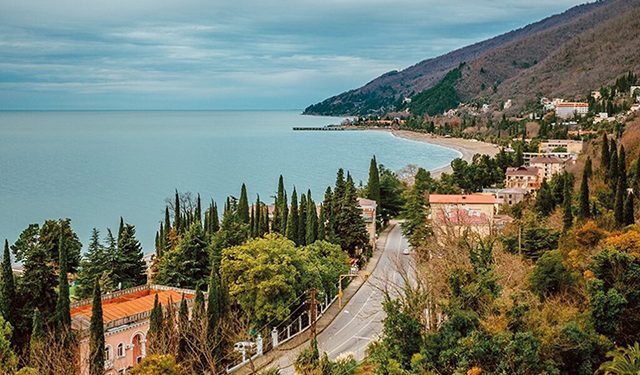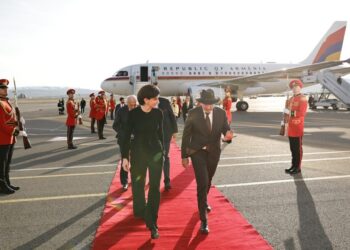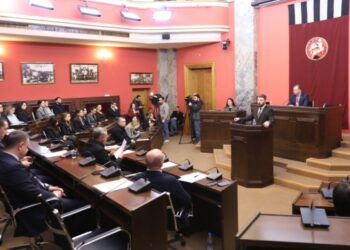For Georgia’s occupied territories of Abkhazia and South Ossetia, 2023 will be a difficult year both economucally and politically. This will serve as a further restraining factor on the separatist regions’ ambitions to gain independence worldwide.
The two regions’ problems begin where their hopes for independence lie: in Russia. The latter invaded Ukraine in February 2022 and instead of quickly imposing a new order, rather undermined its position both economically and politically. It failed to take Kyiv and instead of further weakening the collective West, has helped to strengthen it. Never since the end of the Cold War period has the West been so united when it comes to dealing with/containing Russia.
This has major repercussions for the separatist entities along Russia’s borders, and especially for the Abkhazia and Tskhinvali regions. The first negative trend is Moscow’s decision to recognize the Luhansk and Donetsk separatist regimes and then annex them along with other two Ukrainian territories. On the surface, Abkhazia and the Tskhinvali should have been happy with what Russia did, but as the war turned into a protracted conflict, Russian weaknesses multiplied.
More importantly, the Kremlin’s decision exposed Russia’s approach to separatist entities – Moscow has not been interested in the defense of breakaway territories, but was rather using them for its own geopolitical agenda. The arguments, believed by many in the West, that the Russian invasion of Georgia in 2008 and Ukraine in 2014 were (at least partially) motivated by fears of Russian speakers being oppressed turned out to be false. Moreover, claims that NATO was an instigator of the rivalry with Russia by drawing Georgia and Ukraine into the alliance likewise proved inaccurate at best.
As of February 2022, there are simply too many separatist entities supported by Russia. This lessens the chances for Abkhazia and South Ossetia to gain wider acceptance in the world or even the region. Few, if any, especially amid the Western condemnation of Russia, would go for recognizing Abkhazia and South Ossetia, or the four regions of Ukraine, as part of Russia.
Some plans could materialize, but they will nevertheless remain short of what is often hoped for. For example, there is some approximation taking place between Abkhazia and Belarus. The latter’s president visited the region in 2022, while in January 2023 it was reported that Sokhumi’s commercial representation would be opening in Minsk.
Yet, the biggest problem for Georgia’s occupied territories is the economic situation. Russia is subject to incremental economic and financial sanctions. With Abkhazia and Tskhinvali economically fully dependent on their security patron, the expected difficulties in Russia will have a spillover effect on the two territories.
This, however, does not mean that Russia will not be working toward achieving its goals. The agreement on handing over the Bichvinta resort to Russia will likely be ratified, despite all the confusion and outright negative reaction from within Abkhazia. With the continuing war in Ukraine, Moscow will also push for a steady flow of volunteers from the two regions, where the war has become extremely unpopular.
The Separatist Regions and Tbilisi
Though it is difficult to say what the two separatist regions’ relations with Tbilisi will look like as the geopolitical situation in the region is highly fluid, nevertheless several major trends could be perceived.
First is the emerging understanding between Moscow and Tbilisi. At a time when Russia is preoccupied with its war in Ukraine, it highly values Georgia’s non-committal approach to Western sanctions. Anti-Russian rhetoric, too, is rather low among the Georgian politicians, which for the Kremlin is a highly positive development. Russia, from its side, is being careful not to push hard on Tbilisi when it comes to Abkhazia and South Ossetia.
This tentative mutual understanding could be a critical development for the two regions, who fear that rapprochement between Moscow and Tbilisi might be detrimental to their interests, as Russia needs Georgia’s neutral position. And since the war will likely continue for the foreseeable future, Tbilisi and Moscow might further enhance bilateral understanding.
The fate of the two separatist regions is closely linked to Russia. This is seen as a boon in terms of security, but also as a huge liability when it comes to the economic stability of Abkhazia and South Ossetia. Ramifications will be wide-ranging. Corruption and ever decrepit infrastructure will hamper the two territories’ development. In a way, for Tbilisi, it is an opportunity. In the longer run, some kind of talks could be entertained with Sokhumi. Contingent upon Georgia’s internal economic development, Tbilisi could become more attractive for ordinary Abkhaz and Ossetians. Some experience in that regard is already there. Before 2020, and especially following the pandemic, Georgian medical services attracted numerous residents from the two territories. Similarly, the education sector, with wide ranging state-sponsored incentives, has also attracted a large pool of future students.
Moreover, looking at the South Caucasus from a wider regional perspective, the situation is likewise not attractive for the Abkhazia and Tskhinvali regions. The collective West has hardened its stance on separatist entities. More importantly, however, the EU and NATO now see the importance of the Black Sea and the South Caucasus, signaling that Georgia would have a bigger role for the West. This means potential membership in the EU and a highly intensive cooperation with NATO, trends which are unfavorable for Sokhumi and Tskhinvali.
Analysis by Emil Avdaliani
Emil Avdaliani is a professor at European University and the Director of Middle East Studies at the Georgian think-tank, Geocase.














